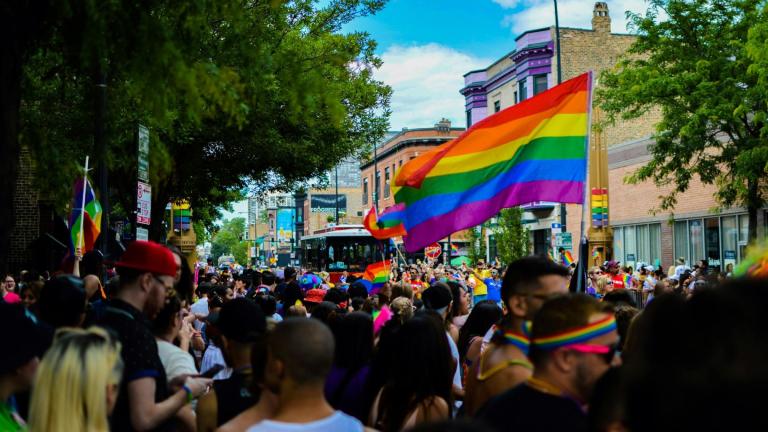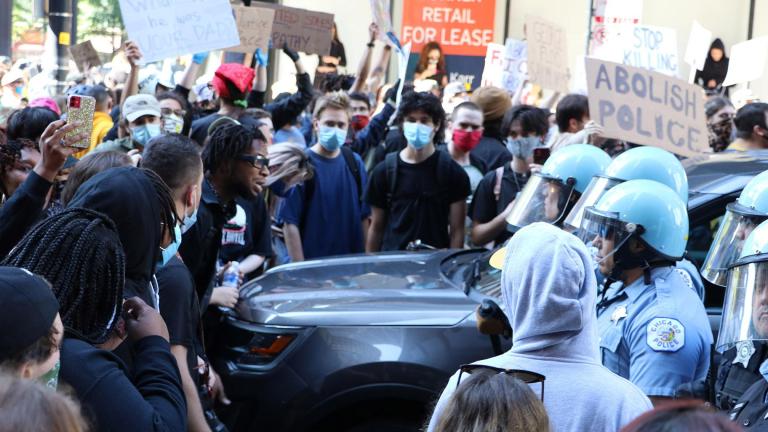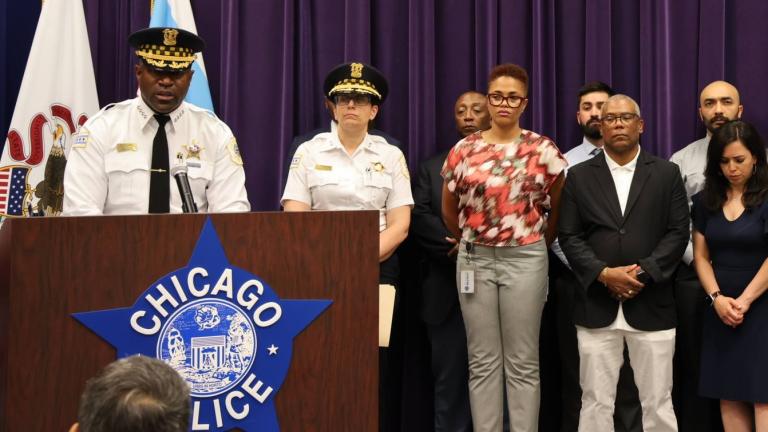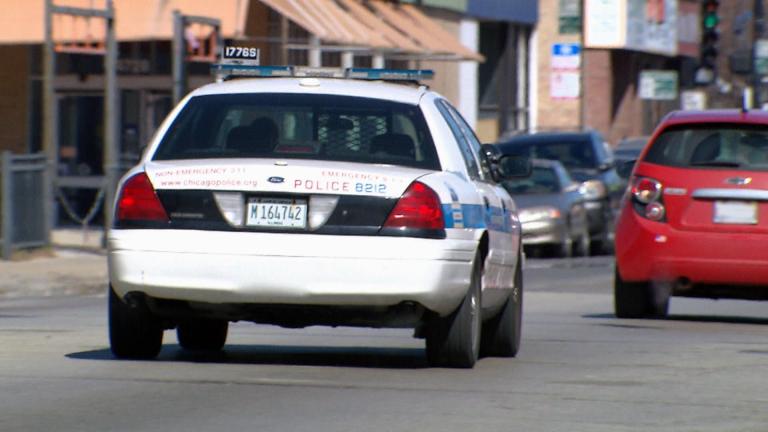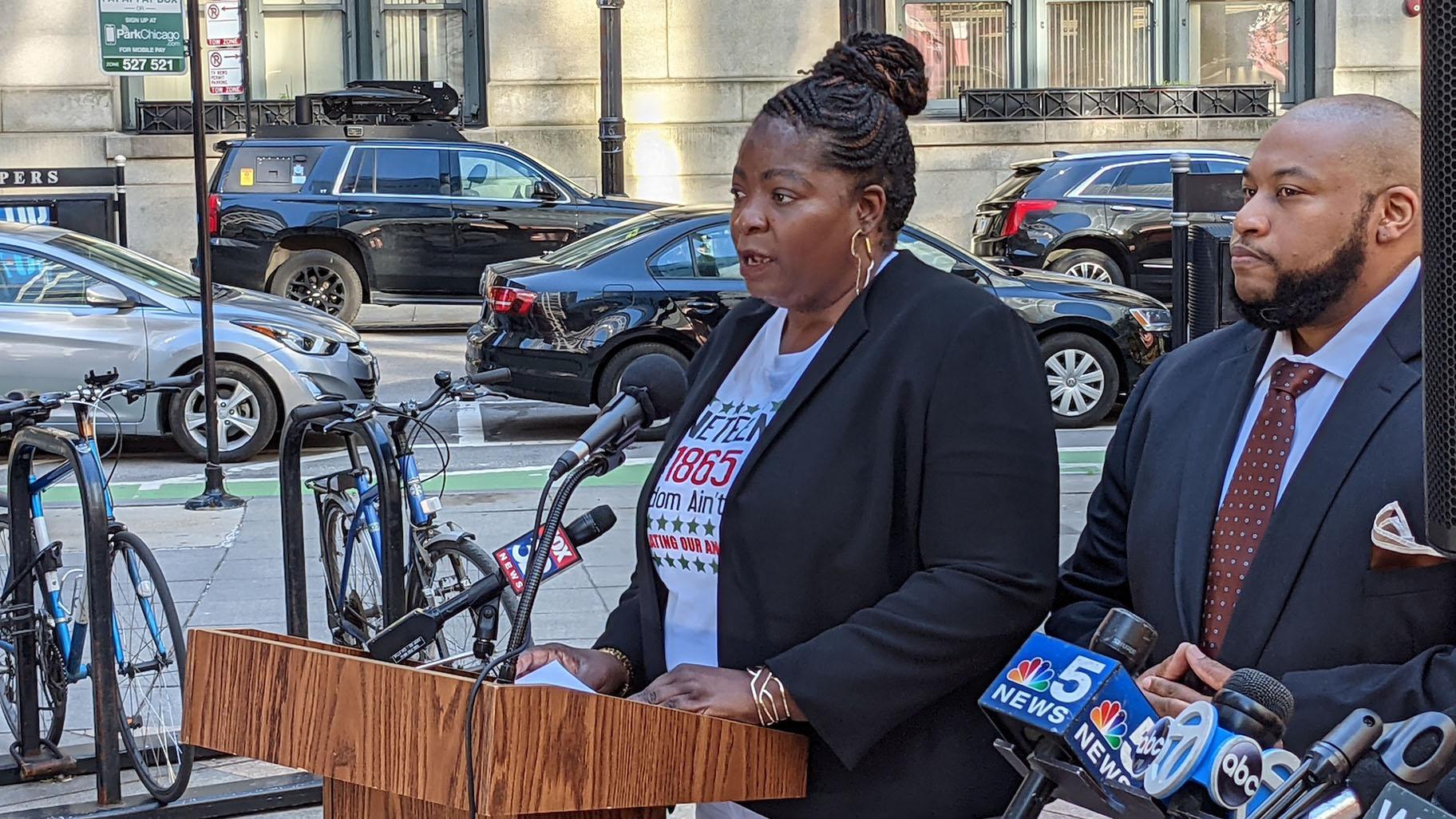 Anjanette Young and her attorney Keenan Saulter speak outside the the James R. Thompson Center on June 16, 2021. (Matt Masterson / WTTW News)
Anjanette Young and her attorney Keenan Saulter speak outside the the James R. Thompson Center on June 16, 2021. (Matt Masterson / WTTW News)
Mayor Lori Lightfoot did not purposefully conceal information about the handling of the February 2019 raid that left Anjanette Young handcuffed while naked and pleading for help, according to the results of a probe ordered by the mayor released Thursday.
However, retired Judge Ann Claire Williams of the Chicago-based law firm Jones Day found “failures in oversight and accountability” by each of the four city departments who were responsible for responding in the aftermath of the raid that touched off a political firestorm.
Neither Lightfoot nor “any current or former city employee took action with malicious intent to add to Ms. Young’s mistreatment or otherwise harm her in connection with the city's response to the search of her home," according to a summary of the report.
Williams repeatedly told reporters that the probe found “no malicious intent” by any city employee in the aftermath of the raid.
Williams said her “long record in public service” and the thoroughness of the report should give Chicagoans confidence in its findings, despite the fact that Williams has cleared Lightfoot and her staff of wrongdoing or misconduct after being hand-picked by the mayor to conduct the probe.
Nominated to the federal bench by former President Ronald Reagan in 1985 to the U.S. District Court, Williams was the first woman of color to serve on a district court in the Seventh Circuit. In 1999, former President Bill Clinton nominated her to the U.S. Court of Appeals, making Williams the third Black woman to serve on any federal circuit court. Williams told reporters she is a “professional acquaintance” of Lightfoot, a former federal prosecutor.
“There is no way I would stand up before you if I wasn’t confident about what we did,” Williams said, calling the effort “independent” of the mayor’s office.
Lightfoot said in a statement the release of the 165-page report would offer a “new level of clarity, and hopefully closure” to the raid and its aftermath.
The mayor said she would review the full report and implement “any policies and procedures that may result as indicated in the investigation.”
The probe, which was conducted at no cost to the city, recommends that city officials “recognize trauma to Chicago residents from psychological and emotional injury, not just physical injury” and improve its response to demands for information from members of the public.
In addition, “some city employees did not adequately consider Ms. Young’s dignity in the course of its actions or prioritize egregious misconduct for fast-track review,” according to a summary of the report released Thursday.
City officials also “did not always follow appropriate procedures, or maintained flawed procedures, or lacked procedures altogether” regarding footage captured by officers’ body-worn cameras, according to the report summary.
Williams said the probe conducted by four former assistant United States attorneys included more than 40 attorneys, lasted 9,000 hours, interviewed more than 40 current and former city employees and reviewed 250,000 city documents.
A separate probe of the raid by the Civilian Office of Police Accountability found evidence that nearly a dozen officers committed nearly 100 acts of misconduct during the search of Young’s home.
That probe lasted 16 months, but Williams said her probe determined that it was inactive until after the news stories and was completed five months later. The inquiry was not prioritized because Young was not physically harmed, according to the probe. That should change, Williams said.
Chicago Police Superintendent David Brown told members of the Chicago City Council the officers who conducted the raid had violated Young’s human rights. Brown has asked the Chicago Police Board to fire the sergeant who led the raid.
Williams also faulted the police department for conducting a “bungled” search for all of the footage captured by the officers’ body-worn cameras. That meant not all of the footage was released to the public or Young and her attorneys after the mayor’s order.
The probe found no evidence that Lightfoot purposely mislead the news media when she told them she learned about the raid only when Chicago’s CBS affiliate, WBBM-TV, published their report. In fact, Lightfoot was told, in detail, that Young, a social worker, had been handcuffed while naked and left unclothed before the news report.
Former Deputy Mayor Susan Lee warned the mayor the “wrongful” raid was “pretty bad” and Lightfoot immediately scheduled a staff meeting to discuss the issue.
However, that meeting focused only on problems with the way that the Chicago Police Department conducted raids and served search warrants and did not discuss what happened to Young, Williams found.
That is consistent with Lightfoot’s account. After Lee’s email was released, the mayor apologized for the focus of the meeting and said she “should have paused to ask more questions about Ms. Young’s well-being and the video itself.”
Former Inspector General Joseph Ferguson sent a 163-page report of his own investigation to Lightfoot just hours before he left office Oct. 15.
Although Lightfoot promised “complete transparency” about what happened to Young, the mayor has repeatedly refused to commit to releasing Ferguson’s report and told WTTW News it was inadequate.
Lightfoot did not “fully cooperate” with his probe, which was stymied by the Jones Day probe, Ferguson said.
The two probes were simultaneous, but the Jones Day probe did not interfere with the inspector general’s report, Williams said.
Williams declined to urge the mayor to release Ferguson’s report, although her report recommends the city do a better job of complying with the Freedom of Information Act, a state law that allows the public right to access records.
The Chicago City Council voted unanimously on Wednesday to pay $2.9 million to resolve the lawsuit brought by Young.
“While my words cannot change what happened to Ms. Young, it is my sincere hope the settlement award and the release of the Jones Day report brings some measure of peace to her, her family, her community, and our city,” Lightfoot said.
Contact Heather Cherone: @HeatherCherone | (773) 569-1863 | [email protected]


